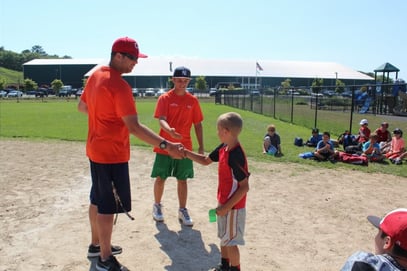 The coach isn’t just some person who stands in front of the kids barking orders. Children’s sports coaches are multi-talented leaders who are there to help their team succeed, teach the rules of the game, impart good sportsmanship and be supportive. That said, coaches aren’t perfect – and neither are you or your child. There will be times when you have to bring up a touchy subject or strike up a not-so-pleasant conversation. Knowing how to effectively communicate with the coach is a must-do for every parent of a young athlete.
The coach isn’t just some person who stands in front of the kids barking orders. Children’s sports coaches are multi-talented leaders who are there to help their team succeed, teach the rules of the game, impart good sportsmanship and be supportive. That said, coaches aren’t perfect – and neither are you or your child. There will be times when you have to bring up a touchy subject or strike up a not-so-pleasant conversation. Knowing how to effectively communicate with the coach is a must-do for every parent of a young athlete.
Talk Off of the Field
You don’t appreciate the way that the coach just yelled at your child when he sat back and didn’t go after the soccer ball. Should you march up to him and speak your mind? Absolutely not. Unless something is happening that puts your child’s (or another child’s) safety in jeopardy, wait until the game is over. Waiting does two things: 1. It gives you time to calm down and think about what just happened. You can prepare what you are going to say and say it without blowing up., and 2. It doesn’t make you seem like ‘that’ parent. You know, the parent who flies off the handle and cusses out the coach in front of the team. Everyone, including your child, is watching you. Act as a role model, keep calm and wait for the right time to talk.
Set a Goal
Whether the problem is the coach’s or your child’s behavior, you need to have a clear goal in mind before starting a conversation. Obviously, coming up with a solution is the overriding objective for any communication with the coach. With that in mind, break the problem down into specific issues. For example, your child whines every time that he has to go to practice. The goals for your conversation with the coach might be to find out if there is a problem with your child and his teammates or get ideas on how to handle the whining.
Listen
What does your child’s coach have that you don’t? An insider’s opinion. The coach may see and know things about your child’s sports play that you don’t. Before jumping to point out flaws or correct coaching behavior, let the coach talk. For example, you’re not thrilled with the lack of playing time that your child is getting. You don’t understand why the coach isn’t putting your child on the field and you’re ready to do something about it. Step back and start by asking what’s going on. It’s possible that your child asked to sit out or that there’s a perfectly acceptable reason.
Work as a Team
Both you and the coach have one common goal – your child’s success. You’re a team, and need to act like one. Remind yourself (and the coach, if needed) that your child’s needs come first. Even if you don’t agree with everything the coach says, you need to keep an open mind.
Communicating with the coach is a fact of life when you’ve got a child who plays a sport. Initiating a conversation in an appropriate way and knowing what to say during your discussion can save time, face, and your child’s team-time fun.










.png)
.png)
.png)
.png)